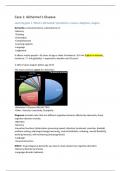Case 1: Alzheimer’s Disease
Learning goal 1: What is Dementia? (symptoms, causes, diagnosis, stages)
Dementia is characterized as a disturbance of:
-Memory
-Thinking
-Orientation
-Comprehension
-Learning capacity
-Language
-Judgement
It affects mainly people > 65 years of age or older. Prevalence: 35.6 mil (higher in women),
incidence: 7.7 mil (globally) -> expected to double next 20 years!
2-10% of cases happen before age of 65
The most common causes for dementia:
-Alzheimer’s Disease (AD) (60-70%)
-Other: Vascular, Lewy body, Tauopathy
Diagnosis includes tasks that test different cognitive domains affected by dementia, these
cognitive domains include:
-Attention
-Memory
-Executive functions (information processing speed, attention (sustained, selective, divided),
problem solving, planning/strategy/reasoning, control/inhibition, initiating, mental flexibility,
working memory, self-monitoring (metacognition))
-Language
-Visuoconstruction.
DSM-5: To get diagnosis dementia you have to have atleast two cognitive disorders:
-Memory disorder (amnesia)
-Language disorder (aphasia)
,-Use of tools disorder (apraxia)
-Difficulty recognizing faces, objects (agnosia)
-Difficulty planning, abstraction, mental flexibility (executive dysfunction)
Furthermore you need to have problems in daily living activities, and no delirium, acute
psychiatric disorders that can interfere with cognitive tests
MCI = mild cognitive impairment
Furthermore other diagnostic measures include:
-MRI scan -> to view ventricular atrophy
-SPECT scan -> in AD, there is less metabolism visible in posterior side of brain (opposite in
frontotemporal dementia)
-CSF test -> test for amyloid-B protein in cerebrospinal fluid, usually lower concentrations in
AD due to less clearance from the brain (high rate of false positives)
-PET scan -> view amount of Amyloid-B directly via injected radiotracers, or view brain
metabolism via FDG-PET (metabolic activity)
Stages of dementia:
Early stage: (year 1-2)
-Become forgetful (short term memory)
-Difficulty in communicating
-Getting lost in familiar places
-Less sense of time
-Difficulty making decisions
-Difficulty with household tasks
-Less active in hobbies
-Depression and anxiety
-Aggression
Middle stage: (year 2-5)
-Very forgetful (names, events)
-Difficulty speech comprehension
,-Getting lost at home/ community
-Unable to cook/clean
-Can’t live alone
-Needs help with washing, toileting, etc
-Wandering, bad sleep, hallucinations, questioning
-Disinhibition
-More aggression
Late stage: (year 5 and onwards)
-Unaware of time and places
-Can’t understand whats happening around them
-Dysphagia
-Can’t recognize relatives/ friends
-Bladder and bowel incontinence
-May be unable to walk/ move
-Increased aggression (kicking/ hitting)
-Can’t navigate house
-Assistance needed for simple tasks
Learning goal 2: What is Alzheimer’s Disease? (Underlying mechanism,
Alzheimer’s vs normal brain, different types)
Brain changes during normal aging (non pathological):
In normal aging, there is declines in speed of processing, working memory, and long term
memory. But no decline in world knowledge.
Cognitive reserve can delay onset of dementia, even in cases of high pathology
, Cognitive reserve can be increased by:
-Getting a higher education
-More complex occupations
-Lifelong learning
-Leisure time with cognitively stimulating activities
-More social interactions
Alzheimer’s disease is the most common type of dementia, it is a progressive disease
beginning with mild memory loss and possibly leading to loss of the ability to carry on a
conversation and respond to the environment. Alzheimer's disease involves parts of the
brain that control thought, memory, and language.
Can be young onset (presenile) AD:
-rare (5-10%)
-Diagnosis before 65 yrs old
-Genetic mutations: presenilin I (chr 13), presenilin 2 (chr 1), amyloid precursor protein (chr
21), APOE 4
-Most often pure form of AD (no other causes)
Key underlying mechanisms of AD:




